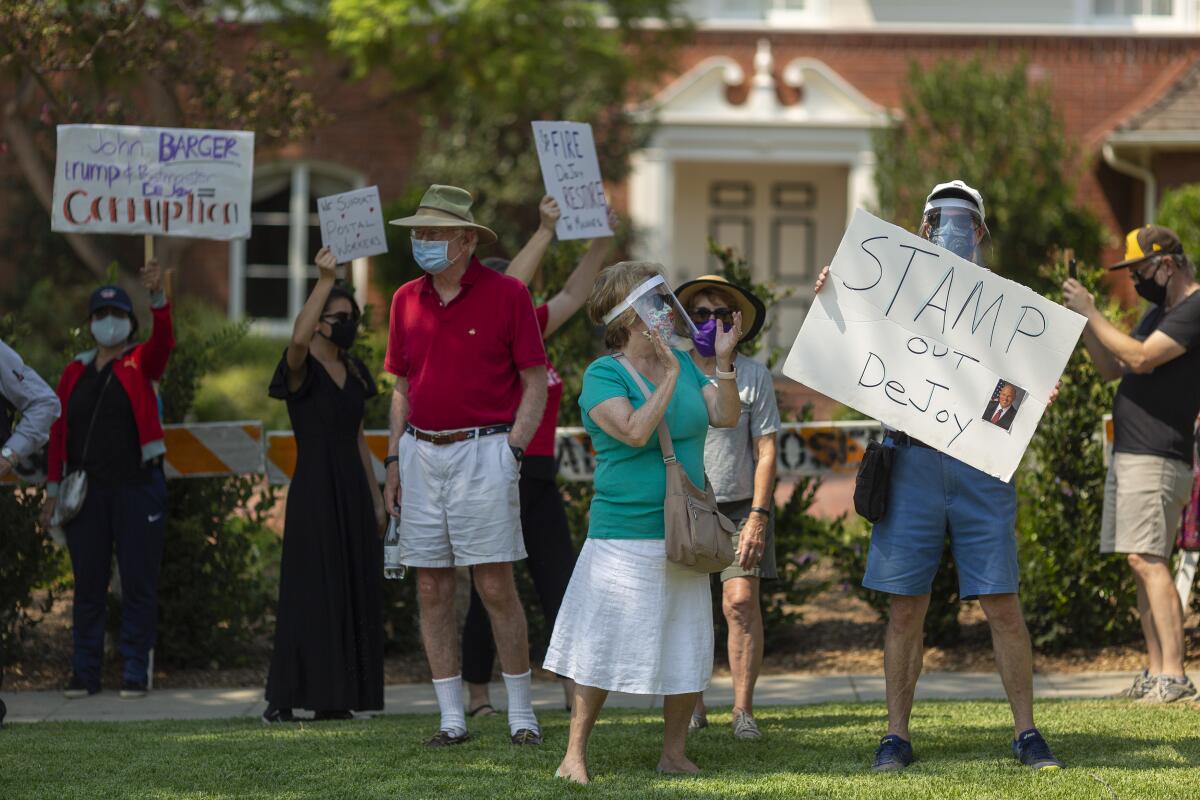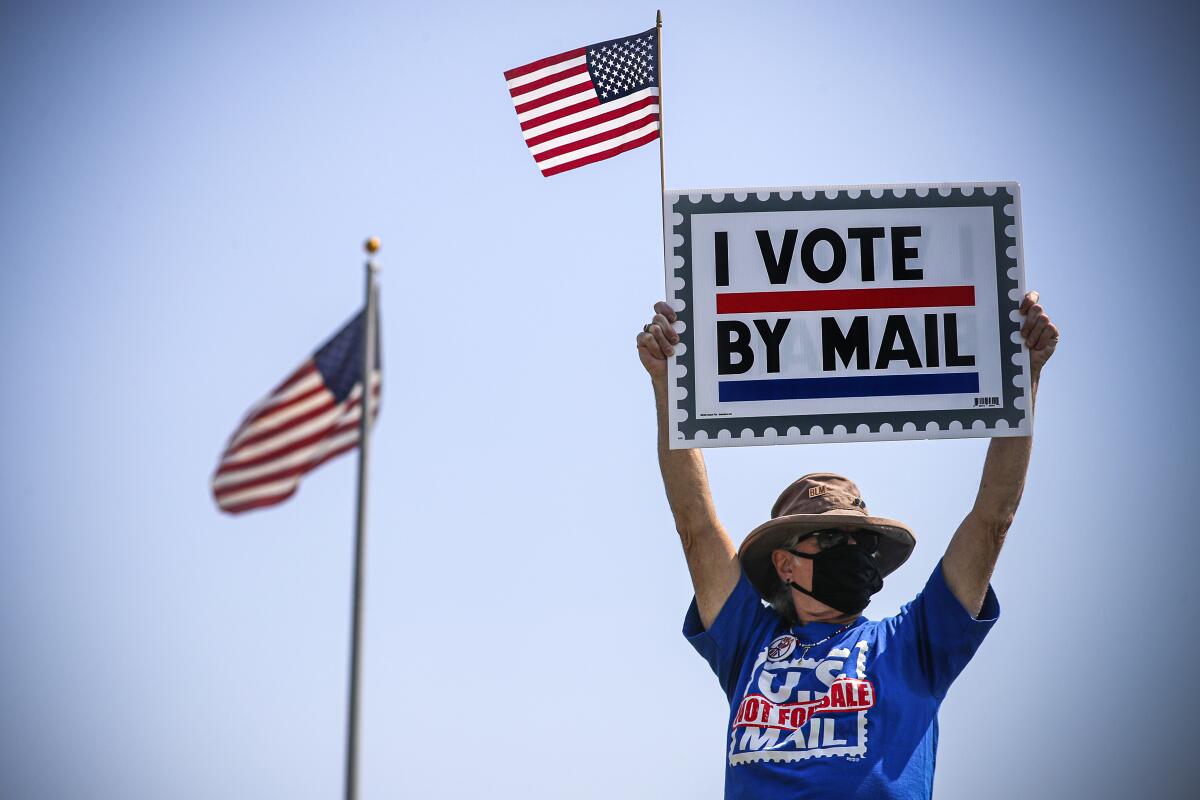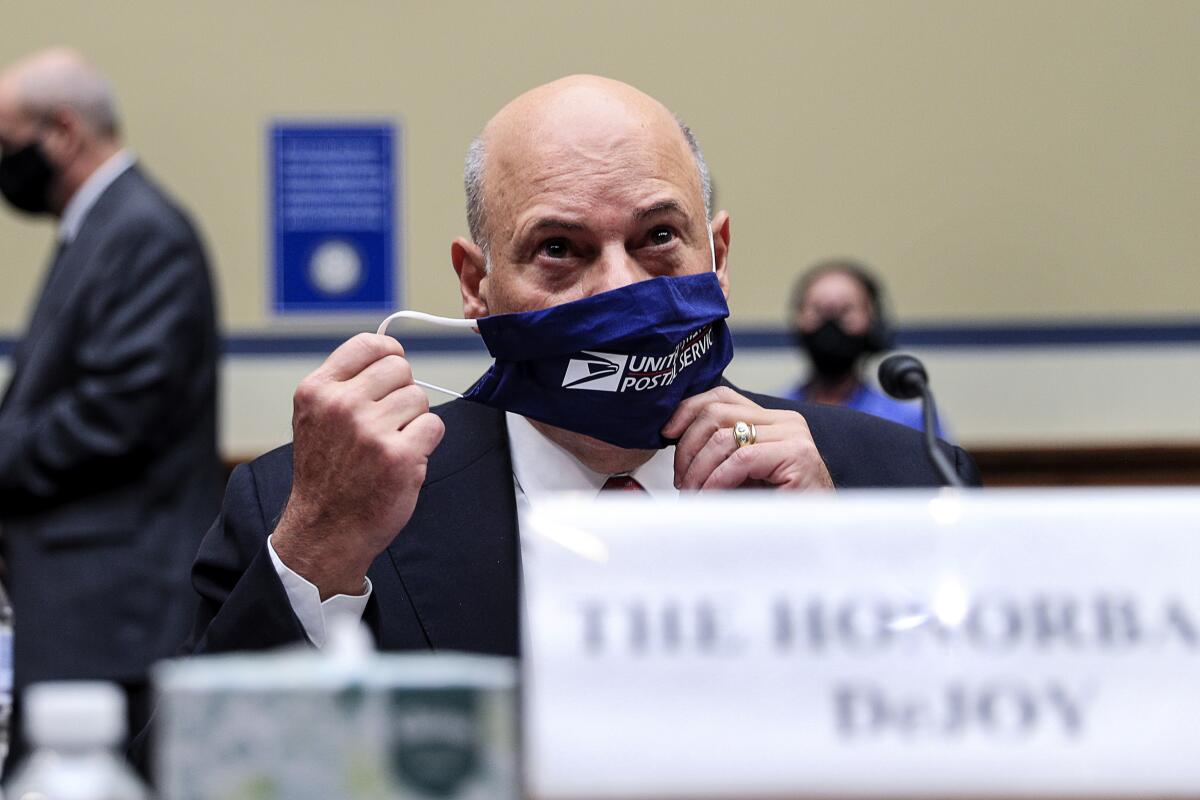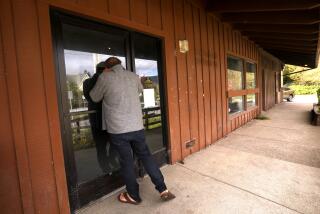An L.A. politico helped select the new postmaster general. Why protesters are at his door

- Share via
The lone woman appeared one day last week at the stately San Marino home of John M. Barger, a small but sure sign that the growing furor over the U.S. Postal Service had arrived on his doorstep. Barger, a financier and Republican political donor, is one of six members of the service’s Board of Governors. The woman wanted to know if the Postal Service would deliver mail-in ballots this fall.
Barger chatted with the woman over a lemonade. She listened politely and moved along.
But on Saturday, demonstrators returned in force, about 70 of them milling about the normally staid neighborhood where Barger lives. “No postage, no peace!” chanted the outsiders. They didn’t leave so readily.
This is the new reality for Barger — a previously low-profile investor and campaign chairman for his sister, Los Angeles County Supervisor Kathryn Barger — who has been thrust into the center of a furor over the operation of America’s mail system. Democrats have railed against mail delays and expressed concerns that President Trump and his allies are trying to sabotage mail-in voting for the November election.
Barger said he had received as many as 100,000 emails and an untold amount of mail on the controversy. Many of the critics fear that Republicans want to turn the Postal Service into a profit-focused business, not a service.

“You need a good Postal Service and honesty,” said Topey Schwarzenbach, a retired architect who picketed outside Barger’s home Saturday. “You don’t need people scheming to turn it into a profit center. These are really a bunch of rip-off artists wanting to carve up every part of our democracy.”
The harshest spotlight of the scandal thus far has fallen on U.S. Postmaster General Louis DeJoy, but Barger is also being scrutinized because of his role in picking DeJoy for the post, the first postmaster general in two decades to come from the private sector.
Democratic lawmakers allege interference by U.S. Treasury Secretary Steven T. Mnuchin and special efforts by Barger to ease the way for the politically connected DeJoy — claiming that Barger jumped to DeJoy’s aid during a rocky job interview with Postal Service board members.
In a lengthy interview, Barger painted himself as a public servant caught up in a political tempest that he did not create.
He rejected accusations that he gave DeJoy special treatment. He said the logistics and delivery executive — who built a company with a handful of employees into a behemoth with more than 9,000 workers — emerged fairly as the strongest candidate to lead the 650,000-worker USPS.
“Louis DeJoy — after all of our interviews and our vetting and deep dives into his background — showed himself to be an uncommonly strong leader,” Barger said in the telephone interview from his San Marino home, as protesters gathered outside.

DeJoy, who took office in June, has acknowledged that some recent measures aimed at making the perennially underfunded Postal Service more efficient led to delivery delays. As the election nears, Barger said the biggest concern for the agency is whether the states will do their part by ensuring that ballots are mailed early enough.
“There is no question that the Postal Service is prepared and equipped to do its job as it always has in supporting elections,” said Barger.
Democrats and some Republicans have been less than reassured, and some are calling for DeJoy’s ouster. A Los Angeles Times review last week found widespread complaints from postal workers and customers about mail stacking up at post offices, undelivered. Carriers described rotting fruit and meat, and baby chicks dead inside boxes that had gone undelivered.
A House committee that questioned DeJoy on Monday released data showing that on-time mail delivery dropped, starting in late June, from more than 90% to less than 85%. Critics linked the declining performance to DeJoy’s slashing of overtime for postal workers and the removal of high-speed letter sorting machines, but DeJoy denied cutting overtime and said the reduction in machines had been ongoing long before his two-month tenure with the USPS.
Barger’s name entered the Washington drama when Democrats said that he had gone outside the standard hiring process to belatedly introduced DeJoy as a candidate for postmaster general.
But Barger said that the six postal governors, including two Democrats, suggested dozens of candidates for the position during last year’s selection process. Among those put forward for the job was former Indiana Gov. Mitch Daniels, who demurred, saying he wanted to continue as president of Purdue University.
It was Robert M. “Mike” Duncan, chairman of the postal Board of Governors, who made DeJoy a candidate, Barger said. Duncan learned about the executive because he serves with DeJoy’s wife on the committee that oversees White House fellows, Barger said.
Although Democrats said DeJoy had not been thoroughly vetted for the position, first held by Benjamin Franklin at the founding of the nation, the postal governors said he was subjected to a full background check, including by the FBI.
DeJoy, 63, built a fortune by turning a small trucking company into a logistics giant that profited by warehousing and crating cargo and mail for delivery. His company, New Breed Logistics, eventually had contracts with giants like Boeing and Verizon. The company, later acquired by XPO Logistics, expanded greatly via work it did for the Postal Service.
The company’s work for the USPS was “highly, highly regarded,” Barger said.
David Williams, a former postal governor, painted a sharply different picture, saying DeJoy gave a lackluster performance when he interviewed to be postmaster general. His second talk with postal governors went so badly that Barger repeatedly intervened to help clarify DeJoy’s answers, said Williams, who later resigned, in part to protest the new postmaster general’s ascension.
Barger called Williams’ account “absurd,” adding: “It is beyond credulity to think that … anyone, including me, would ever presume to have to help him through any interview” given DeJoy’s strong background in the delivery business.
It was four decades ago that Barger got a much quieter start in the world of politics and government. He had graduated from Ohio Wesleyan University and was working as a roofer when he joined Mike Antonovich’s campaign for Los Angeles County supervisor. Antonovich defeated incumbent Baxter Ward in 1980 and Barger joined him as an aide for a year.
He then went to law school and, later, business school and eventually founded his own investment and financial advising firm, NorthernCross Partners. For seven years, until 2016, he served as a member and chairman of the investment committee advising the pension system for Los Angeles County employees, the biggest of its kind in America.
Younger sister Kathryn followed him into Antonovich’s county office. She eventually became chief of staff. When the nine-term supervisor termed out of office in 2016, she ran to replace him, with her brother serving as her campaign chairman. Kathryn Barger won with 59% of the vote to take office in 2016. She secured a second term in this year’s March primary.
Barger’s arrival on the national stage came as a surprise. Treasury Secretary Mnuchin contacted him after a mutual “associate” recommended him for the job at the service, Barger said. He declined to identify the associate, saying he didn’t want to drag the individual into the current imbroglio.
Unlike DeJoy, records show Barger has not donated to President Trump, but Barger said he voted for him in 2016.
Trump has for several years made clear his distaste for the Postal Service, belittling the most popular agency connected to the U.S. government as a “loser” and saying it effectively subsidizes Amazon and other delivery giants. More recently, the president’s campaign has opined, without evidence, that mail-in ballots would open the door to “massive fraud” in the November election. (Trump’s animus for Amazon extends to its founder, Jeff Bezos, owner of the Washington Post, a persistent critic of the president.)
Barger said his conversation with Mnuchin about joining the Postal Service board extended only to the desire to improve efficiency and operations. When he went before the U.S. Senate for confirmation, he said none of the lawmakers expressed concern about delivering ballots on time. “It was just never an issue at that time,” Barger said.
Facing hostile questioning and more calls for his resignation before a House committee Monday, DeJoy assured Democrats: “I am not engaged in sabotaging the election,” adding: “We will do everything in our power and structure to deliver the ballots on time.”
Postal Service board members — four Republicans and two Democrats, all appointed by the Trump administration — have issued similar assurances. They also have said they will act independently to support the performance of the institution.
Last week, Barger was named to a committee of the Board of Governors (along with the two Democrats) pledging to support mail-in voting’s “indispensable role” in the electoral process.
“It’s not a business,” said Barger. “It is an institution of government. It is something that we need to make sure we not only preserve, but that we improve. Because we want it to go on for another 250 years.”
More to Read
Sign up for Essential California
The most important California stories and recommendations in your inbox every morning.
You may occasionally receive promotional content from the Los Angeles Times.











